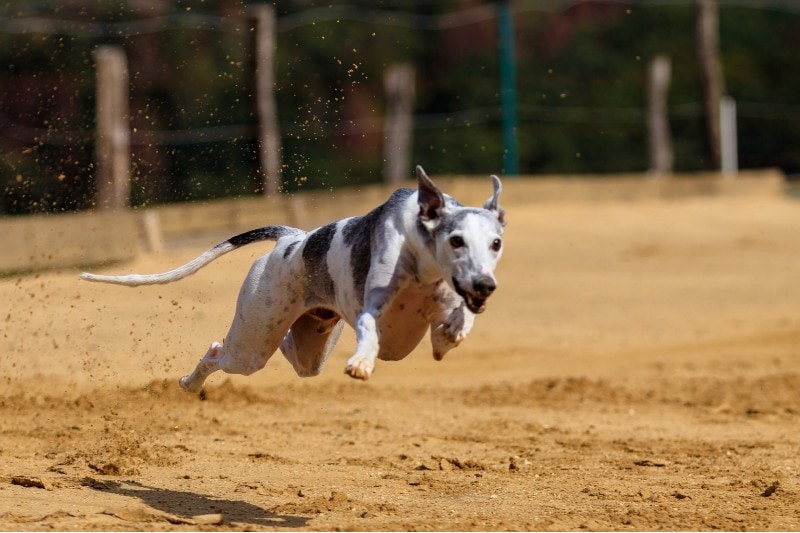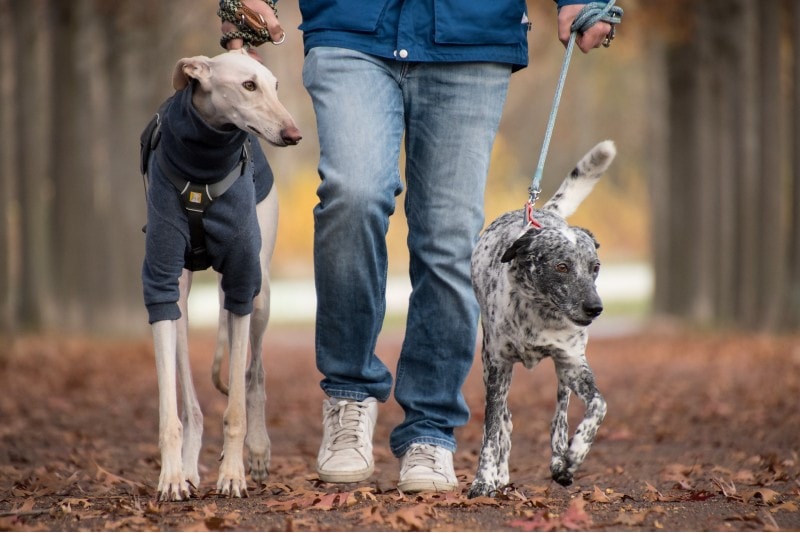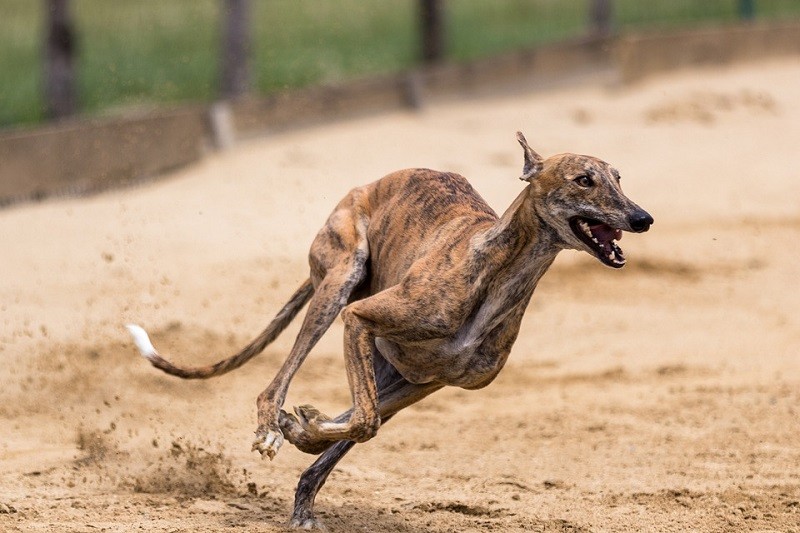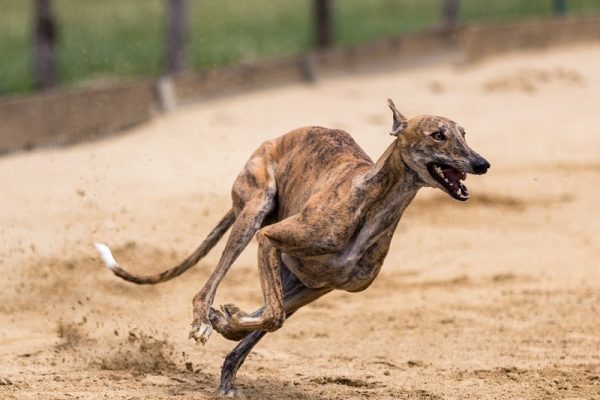Click to Skip Ahead
Most people know that Greyhounds are the fastest domestic dogs on record, reaching speeds of 35 mph, with one reaching a record speed of 41.83 mph!1 Hundreds of years ago, this breed was originally developed for hunting and tracking prey, and until recently, their impressive speed made them the top choice for dog racing.
But is Greyhound racing legal? Is wagering on Greyhound racing (or any kind of commercial dog racing) legal in the U.S.A.?
It’s an important distinction and a complicated question with no easy answers, but yes, wagering on Greyhound racing is still legal in multiple states. West Virginia is the only state with a legal and active Greyhound racing industry.
Keep reading to learn the facts, fallacies, and objective truths about Greyhound racing.
Legal vs. Not-Legal: A Matter of Semantics
“It’s illegal in 42 states” is one of the most contentious statements about Greyhound racing—it’s technically and mostly true but somewhat misleading. It would be safer to say that Greyhound racing is “not-legal” in some of those states. Gambling on and participating in unlawful dog racing is absolutely illegal in most of the states.
Dog racing in itself is not always illegal, though. For example, you’re free to let your dogs run around a track to their heart’s content, but depending on where you are, it might be illegal to bet on the outcome of dog races. Then it gets more confusing.
Let’s consider a few examples:
- Dog racing is banned in Louisiana and gambling on dog racing is prohibited.
- Colorado has a state law prohibiting in-state Greyhound racing, but it’s completely legal to wager on out-of-state racing.
- Illinois has exceptionally regulated gaming restrictions, but dog racing is not specifically mentioned in modern legislation. By all accounts, though, it’s not-legal because all forms of gambling must be legalized to be regulated and recognized. To the best of our knowledge, you cannot legally bet on dog racing in the State of Illinois.
Where Is Greyhound Racing Legal?

- Alabama
- Arkansas
- Connecticut
- Iowa
- Kansas
- Texas
- West Virginia
- Wisconsin
All these states authorize pari-mutuel wagering; however, West Virginia is currently the only state with an active Greyhound track. Although the rest of the states do not have an active park, laws are still in place to legalize the practice.
What Is Pari-Mutuel Wagering?
Otherwise known as “pool betting,” pari-mutuel wagering is a betting system in which all bets are grouped into a pool (or pot), and payoff odds are calculated by the size and frequency of wagers. This type of gambling is used in horse racing, Greyhound racing, and random lottery games.

Frequently Asked Questions
Do Greyhound Racing Tracks Have Licenses?

Absolutely. All those states’ tracks must also have a license to operate races. But the specifics vary state by state. Let’s have a look at the rules that certain states must legally adhere to:
- Wisconsin has its own department of administration that supervises, regulates, and issues licenses to greyhound racing parks. If someone is applying for a license for the first time, they need a resolution accepted by the town or city governing body supporting the development and ownership of the track.
- Alabama, West Virginia, Arkansas, and Kansas conduct a local option election within municipalities or counties to obtain a license to operate a dog racing track.
- In Connecticut, the Commissioner of Consumer Protection supervises and regulates greyhound racing.
Are There Laws Protecting the Greyhounds?
Greyhound racing has gained a questionable reputation, so some states do have laws in place that protect the breed. However, there is considerable debate about the practical legality of the activity, which is another way of saying that a few of the laws (or lack thereof) leave room for ambiguity.
- In Iowa, there is a provision to prohibit dogs from participating in races that have been drugged or numbed. Dogs can be tested for drugs, and if found present in their system, the owner can be charged with a felony.
- In Texas, H.R. (House Resolution) 3894, SEC. 30. PROTECTION OF GREYHOUNDS, states, “It shall be unlawful—(1) for any person to knowingly engage in commercial greyhound racing, live lure training, or open field coursing events in which any animal is moved in interstate or foreign commerce; (2) to conduct commercial greyhound racing or racing meeting where any form of betting or wagering on the speed or ability of greyhounds occurs; (3) to conduct open field coursing or live lure training with the use of any bait that is not an inanimate object; (4) to engage in or facilitate simulcast betting or wagering on greyhound races in interstate or foreign commerce; and (5) for any person to knowingly sell, buy, possess, train, transport, deliver, or receive any animal for purposes of having the animal participate in commercial greyhound racing, live lure training, or open field coursing events.”
- Alabama has a provision protecting dogs from having mechanical devices used on them that do not qualify as regulated racing equipment. The provision also protects the dog from being given drugs or medications that are outside authorized medical purposes.
- Kansas allows its racing commission to adopt rules regarding medications.
- Wisconsin has several provisions protecting Greyhounds. A notable one states that “no person may kill or cause to be killed any race dog or dog that was bred or trained in the state for racing except by a humane chemical method that is specified by the department.”
What Happens to the Dogs After They Retire?

This is a question that many people ask. Thankfully, some states have laws that protect retired Greyhounds.
- Iowa has a provision that requires all licensed race tracks to maintain a dog adoption program. This is the only state that has this provision.
- Wisconsin has a provision requiring humane treatment of all racing Greyhounds (and other racing animals) throughout their lives.
While some retired Greyhounds are kept by the individuals who raced them, many are not. Often, when a Greyhound retires, they are put up for adoption. There are dozens of organizations that work to rehome retired Greyhounds specifically.

Our Stance on Greyhound Racing
The Dogster Team believes that organized dog racing is an inexcusable relic of a time when dogs were treated as expendable commodities and subjected to the whims of capricious human vanity and greed.
Certainly, there is nothing wrong with allowing a dog to participate in breed-specific activities, such as running at high speeds or following a scent trail. Greyhounds should be allowed to run freely. However, we reject the practices of breeding, training, and discarding dogs in the service of gambling and in the name of “sport,” regardless of how normalized it’s become in Greyhound racing circles.
Is Greyhound Racing Cruel?
This depends on your definition of “cruel.” There are people who race Greyhounds and treat them humanely. Some even consider them companions and keep them after they retire from racing, caring for the dogs for the rest of their lives.
We hope that with the current provisions and regulations in place, people who race Greyhounds will treat them with respect. This means caring for them physically and mentally. Many people take their role as caretakers to racing Greyhounds (active or retired) seriously. But not all do.
Only a handful of states continue to race Greyhounds legally, and unfortunately, the dark side of dog racing preceded this drive to eradicate the practice. We have read reports that dogs were pushed to their physical limit, drugged to numb pain from racing injuries, or discarded once they were no longer needed on the race track.
Hopefully, these ugly truths are becoming a thing of the past. Tracks that ignored animal cruelty were shut down permanently. Many people who mistreated animals were caught and penalized.
Who Is Leading the Charge to Eliminate Greyhound Racing?

GREY2K USA Worldwide is the leading Greyhound protection organization in the U.S., with rescue and adoption programs around the world. Formed in 2001, the non-profit organization is working to legislate Greyhound protection laws and eliminate dog racing on an international scale. They are currently leading the push to ban Greyhound racing nationwide with The U.S. Greyhound Protection Act, which has bipartisan support in Congress.
Final Thoughts
Greyhound racing is currently legal in some states. While the reasons for that vary, concerns over the welfare of the dogs are at the forefront of legislation. The provisions that states like Iowa and Wisconsin have instilled show that the industry can be conducted safely and humanely. While it might be too late for race tracks in certain states, the licensing and animal protection provisions are a step in the right direction.
Featured Image Credit: EcoPrint, Shutterstock









